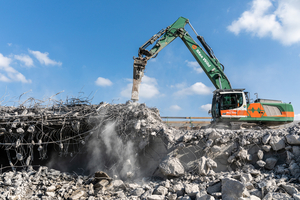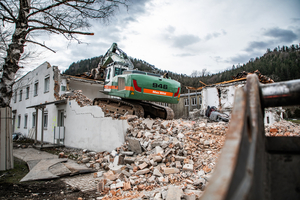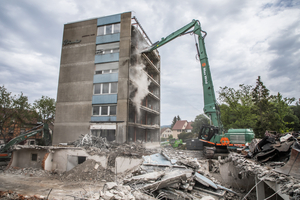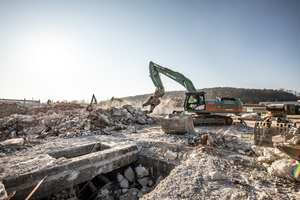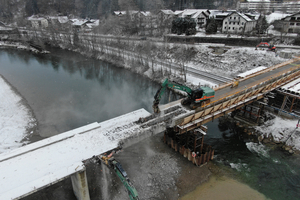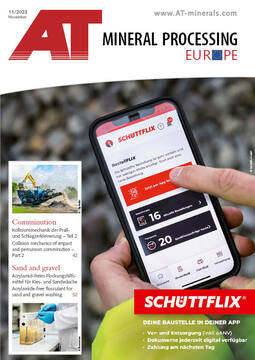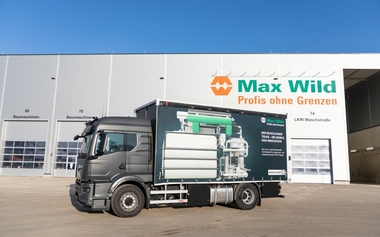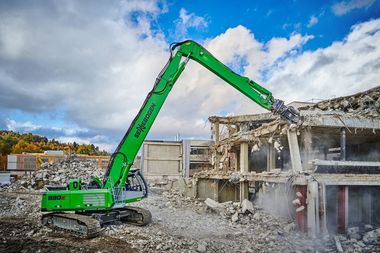Max Wild creates space for new ideas and uses
Max Wild has decades of experience in engineering demolition. “We have been in the demolition business for 50 years and implement around 300 demolition projects every year – in other words, a project almost every day,” explains Markus Wild, one of the managing directors at Max Wild. “We have a large demolition team with around 150 employees and combine different service areas, such as heavy move as well as earthworks and civil engineering, under the Max Wild umbrella in addition to demolition. This makes us particularly efficient and offers our customers an all-round carefree package,” Markus Wild continues.
Everything from a single source
Max Wild takes care of all the important steps of a demolition project: from planning to securing the construction site and dismantling the structure to disposing of the materials. The professionals also have the building substance survey in their portfolio without limits, which concerns almost all buildings erected before the year 2000. The employees of Max Wild are trained in the detection and sampling of building substances containing harmful substances in the buildings. In this way, building owners know at an early stage about possible pollutant contamination of the building fabric and save time and money by removing the pollutant-containing materials in good time.
Max Wild’s mobile construction material recycling is also time and cost efficient, directly on site at the construction site. The mobile crushing plants process a large part of the mineral construction waste produced during demolition. In this way, concrete, building rubble or asphalt are turned into ready-to-build secondary building materials in any desired grain size, which can be directly reused on the construction site. “With our mobile construction material recycling, we kill two birds with one stone: Transporting the demolition material is cost-intensive and requires time and logistics. At the same time, there is often a lack of filling material on the construction sites, which in turn has to be transported to the construction site. We solve both problems with on-site recycling and save valuable resources and the CO2 balance in the process,” Markus Wild clarifies the advantages for the building owner and the environment.
Bridge demolition
When demolishing a bridge, maximum speed and minimum disruption of the traffic flow are required. That is why Max Wild attaches great importance to good planning and coordination in advance. On the construction site, too, the work steps are closely interlocked: demolition excavators with concrete shears, excavators for processing the recycled materials and the fleet of trucks for transporting away the demolished masses. State-of-the-art machine technology and close coordination of the individual work steps and the employees on site ensure the smoothest and most efficient deconstruction possible.
Where infrastructure in construction or industry needs to be renewed, the professionals without limits from the “Heavy Move” service area come into play. With a lot of know-how and special systems, they replace industrial components or move entire bridges or buildings. “Lifting, lowering and moving heavy loads and goods is our core competence. We get every heavyweight moving and find the right solution for every requirement,” says Kurt Bicker, Business Unit Manager Bridge Demolition and Heavy Move at Max Wild.
Building and industrial demolition
The engineering demolition of office space, industrial halls and residential buildings often poses special challenges: roads and neighbouring houses only a few metres away not only make for cramped conditions on the construction site, but also demand absolute caution and forward planning. In addition to planning, dismantling and disposing of demolition materials, the specialists from Berkheim also take care of sorting and separating building materials, disposing of materials containing hazardous substances and gutting and clearing out, among other things.
In building and industrial demolition, Max Wild offers its customers a special complete package: from demolition to complete clearance. “We hand over a turnkey excavation, so to speak,” clarifies Markus Wild. Max Wild’s all-round service reduces the time and costs in the demolition project and guarantees builders an economical result and the perfect basis for new construction projects.
Deconstruction in lofty heights
It is in challenging demolition projects that Max Wild demonstrates its expertise and know-how, as in the engineering deconstruction of an almost 30-m-high high-bay warehouse in Augsburg/Bavaria. There, the professionals without borders not only took over the dismantling of the building shell, but also the gutting of the head building as well as the deconstruction of the ramps and canopies. In total, Max Wild gutted 23 000 m³ and deconstructed 229 000 m³. “The project was special in two respects: Firstly, the building was very high, so we had to work with special machines such as a longfront excavator. Secondly, there were neighbouring buildings directly around the high-bay warehouse, which always makes engineering demolition a challenge. But this is exactly where our special expertise lies, in demolition within built-up areas,” Markus Wild explains.
At the end of the deconstruction, there were around 2300 t of demolition material, such as concrete and steel, as well as 135 t of mineral wool insulation. Stones and concrete were processed into secondary building materials in Max Wild’s recycling plants, the steel was melted down in a foundry and recycled, and most of the mineral wool insulation was also recycled. For this, the professionals without borders worked with a local partner.

